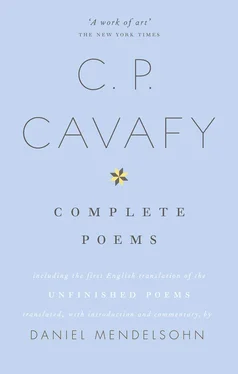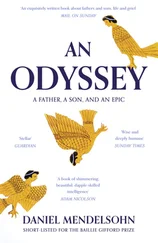The fulfillment of their illicit pleasure
is accomplished. They’ve risen from the bed,
and dress themselves quickly without speaking.
They emerge separately, covertly, from the house. And while
they walk rather uneasily in the street, it seems
as if they suspect that something about them betrays
what kind of bed they’d fallen into just before.
Nonetheless, how the artist’s life has gained.
Tomorrow, the day after, or through the years he’ll write
powerful lines, that here was their beginning.
[ 1915 ; 1921]
Favour of Alexander Balas
Oh I’m not put out because my chariot’s
wheel was smashed, and I’m down one silly win.
I shall pass the night among fine wines
and lovely roses. All Antioch is mine.
I am the most exalted of young men.
I’m Balas’s weakness, the one he worships.
Tomorrow, you’ll see, they’ll say the race wasn’t proper.
(But if I were vulgar, and had secretly given the order—
they’d even have placed my crippled chariot first, the flatterers.)
[ 1916? ; 1921]
Melancholy of Jason, Son of Cleander: Poet in Commagene: 595 A.D.
The aging of my body and my looks
is a wound from a terrible knife.
I have no means whatsoever to endure it.
Unto you I turn, Art of Poetry,
you who know something of drugs;
of attempts to numb pain, in Imagination and Word.
It’s a wound from a terrible knife.—
Bring on your drugs, Art of Poetry,
which make it impossible—for a while—to feel the wound.
[ 1918? ; 1921]
The theme, “The Character of Demaratus,”
which Porphyry has suggested to him in conversation,
the young scholar outlined as follows
(intending, afterwards, to flesh it out rhetorically).
“At first the courtier of King Darius, and then
a courtier of King Xerxes;
and now accompanying Xerxes and his army,
to vindicate himself at last: Demaratus.
“A great injustice had been done to him.
He was the son of Ariston. Shamelessly
his enemies had bribed the oracle.
Nor did they fail to deprive him of his throne;
but when at last he yielded, and decided
to resign himself to living as a private person
they had to go and insult him before the people,
they had to go and humiliate him, in public, at the festival.
“And so it is that he serves Xerxes with such great zeal.
Accompanying the enormous Persian army
he too will make his return to Sparta;
and, a king once more, how swiftly
he will drive him out, will degrade
that conniving Leotychides.
“And so his days pass by, full of concerns:
giving the Persians counsel, explaining to them
what they need to do to conquer Greece.
“Many worries, much reflection, which is why
the days of Demaratus are so dreary.
Many worries, much reflection, which is why
Demaratus doesn’t have a moment’s pleasure;
since pleasure isn’t what he’s feeling
(it’s not; he won’t acknowledge it;
how can he call it pleasure? it’s the acme of his misfortune)
when everything reveals to him quite clearly
that the Greeks will emerge victorious.”
[ 1904 ; 1911 ; 1921]
I’m sitting and musing. I brought to Art
longings and feelings— some half-glimpsed
faces or lines; some uncertain mem’ries
of unfulfilled loves. Let me submit to it.
It knows how to shape the Form of Beauty;
almost imperceptibly filling out life,
piecing together impressions, piecing together the days.
[ 1921 ; 1921]
From the School of the Renowned Philosopher
He remained Ammonius Saccas’s student for two years;
but of philosophy and of Saccas he grew bored.
Afterward he went into politics.
But he gave it up. The Prefect was a fool;
and those around him solemn, pompous stiffs;
their Greek horribly uncouth, the wretches.
His curiosity was aroused,
a bit, by the Church: to be baptized,
to pass as a Christian. But he quickly
changed his mind. He’d surely get in a row
with his parents, so ostentatiously pagan:
and they’d immediately put an end—an awful thought—
to his extremely generous allowance.
Still, he had to do something. He became an habitué
of the depraved houses of Alexandria,
of every secret den of debauchery.
In this, fortune had been kind to him:
had given him a form of highest comeliness.
And he delighted in that heavenly gift.
For at least another ten years yet
his beauty would endure. After that—
perhaps to Saccas he would go once more.
And if in the meantime the old man had died,
he’d go to some other philosopher or sophist;
someone suitable can always be found.
Or in the end, it was possible he’d even return
to politics—admirably mindful
of his family traditions,
duty to one’s country, and other pomposities of that sort.
[ 1921 ; 1921]
On this mixing-bowl of the purest silver—
which was made for the home of Heracleides,
where great elegance always is the rule—
note the stylish blooms, and the brooks, the thyme;
and in the middle I put a beautiful young man,
naked, sensuous; he still keeps one leg,
just one, in the water.— O Memory, I have begged
to find in you the best of guides, that I might make
the face of the youth I loved as it really was.
This has proved to be very difficult since
some fifteen years have passed since the day on which
he fell, a soldier, in the defeat at Magnesia.
[ 1903 ; 1912 ; 1921]
Those Who Fought on Behalf of the Achaean League
You brave, who fought and fell in glory:
who had no fear of those who’d conquered everywhere.
You blameless, even if Diaeus and Critolaus blundered.
Whensoever the Greeks should want to boast,
“Such are the men our race produces,” is what they’ll say
about you. That’s how marvelous the praise for you will be.—
Written in Alexandria by an Achaean:
in the seventh year of Ptolemy, the “Chickpea.”
[ 1922 ; 1922]
The young Antiochene said to the king,
“In my heart there beats a single precious hope:
the Macedonians again, Antiochus Epiphanes,
the Macedonians are back in the great fight again.
If only they would win— I’ll give to anyone who wants them
the horses and the lion, the Pan made out of coral,
and the elegant mansion, and the gardens in Tyre,
and everything else you’ve given me, Antiochus Epiphanes.”
Maybe he was moved a little bit, the king.
But he recalled at once his father and his brother,
and so made no response. Some eavesdropper might
go and repeat something.— Anyway, as expected,
at Pydna there swiftly came the horrible conclusion.
[ 1911? ; 1922 ; 1922]
In an old book—about a hundred years old—
I found, neglected among the leaves,
a watercolour with no signature.
It must have been the work of a very powerful artist.
It bore the title “Representation of Love.”
But “—of the love of extreme sensualists” would have been more fitting.
Читать дальше












